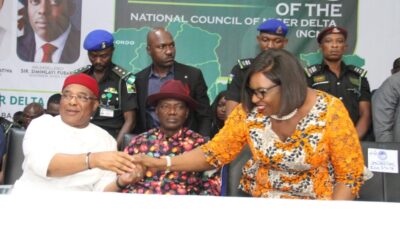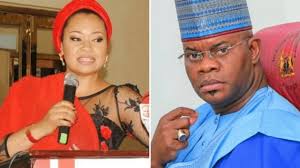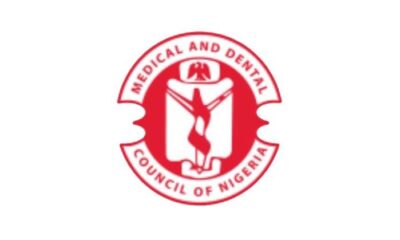Opinion
Talibani Nigerian
With the fall of Kabul on 15 August, 2021, the Taliban gained control of Afghanistan, after many years of insurgency and clamour for a total sway of Sharia Islamic Law and political system. Afghanistan is a landlocked country in southern Asia; a mountainous nation with less than 15% of the land suitable for farming. Over 90% of its natural gas produced in the northern part of the country was piped across long distance into the former USSR. There was a civil war with the Soviet.
The Taliban emerged in 1994, after the Afghan civil war with the Soviet, whose membership consisted of Afghan students (Talib means students). Operating first as an advocacy group, the Talibans pursued the goal of strict interpretation and enforcement of Islamic Sharia Law, with increasing militancy. Four major ethic groups in the country (Pushtuns, Tajiks, Hazaras and Uzbeks) are not all Moslem; rather, Budhism has a history of about 2,000 years in Afghanistan.
Long-standing ethnic conflicts have made it difficult to exploit the country’s large oil reserves; neither would the Pushtun ethnic group which is the strongest, create room for peaceful co-existence with other groups. Ethnic conflicts and animosities are not peculiar to Afghanistan alone, but what is sad is the refusal to shift group in terms of mutual tolerance and understanding which can foster expanded awareness. With bigotry, conceit and dogmatism, especially where mutual tolerance is lacking, then development would be hampered.
From Afghanistan comes this message for Nigeria that bigotry, conceit and dogmatic interpretations of the scriptures usually give rise to conflicts and animosities among various groups who share a common nationality. Religious ideological learnings which refuse to accommodate, examine or benefit from other different worldviews, rarely build an ideal humanity. Yet, human well-being and perception expand and improve better with a mind that is not hampered by bigotry, conceit and dogmatism.
Sadly, political and religious leaders, for the sake of expansion of power or fear of losing support, do foster dogmatic adherence to ideologies, thus fueling divisions and animosities among people. As a group of militant advocates and strict interpreters and enforcers of Islamic Sharia Law, the Talibans of Afghanistan since 1994, did not want to shift any ground or make concessions, but under the leadership of Mohammed Omar, the movement spread out, with a missionary zeal of total conquest. By 1996 the group transferred the nation’s capital to Kandahar from Kabul.
Situation changed with an American-led intervention force in December 2000, following the September 11 attack on USA. The Talibans were accorded diplomatic recognition by Pakistan, Saudi Arabia and the United Arab Emirates. Insurgency movements began again to fight the USA-backed Karzai administration and NATO-led International Security Assistance Force (ISAF). The Talibans had been condemned globally for their extremist interpretations and enforcement of Sharia Law. They were called terrorists, not bandits!
Between 1996-2001 the Talibans and their allies had massacred thousands of people, denied UN food supplies to over 160,000 starving refugees and children and engaged in shocking public flogging of people for minor infractions. Specifically, girls and women were restricted from attending schools and engaging in certain jobs, except healthcare. Public whipping of girls and women sparked outrage among foreigners in Afghanisan, neither would journalists be allowed to photograph cases of abuses or publish any of such cases. It was a reign of terror!
Religious and ethnic minorities were heavily discriminated against during Taliban rule, with several unreported cases of genocide, destruction of other religious movements or sects, except Islam. The Pushtun ethnic group is the strongest and leading advocate of Sharia law, based on Deobandi fundamentalism, which adopts strict devotion to the Sharia. Since Russia withdrew from Afghanistan in 1989, the country’s ethnic groups had had no peace among themselves, largely because of religious conflicts. Neither did USA-intervention efforts change the situation much.
There had been intelligence reports alleging that the military and security services provided support which kept the Talibans active for so long, especially during the founding stage. It was also reported that over 2,500 Arabs under the command of Al Qaeda leader ,Osama bin Laden, fought for the Talibans. But allegations about the Talibans having established cells or units in various African countries, including Nigeria, may not be taken quite seriously for now. There were reports of university students being indoctrinated.
During the tenure of President Olusegun Obasanjo, there was a large-scale clamour all over Northern Nigeria for the adoption and implementation of Sharia Law. Tactfully, that clamour was not allowed to plunge Nigeria into a state of large-scale instability, but there was more to the Sharia Law movement than met the eye. There were security allegations that several Islamic countries, including Afghanistan, brought serious pressure on the Organisation of Islamic Conference (OIC) to declare Nigeria as an Islamic state. Whether such allegation can be taken seriously or not, what is incontrovertible is that aggressive Boko Haram insurgency increased with the clamour for Sharia Law in Nigeria.
More specifically, the pattern which insurgency, militancy, banditory and killings by unknown gunmen took in Nigeria in the past 20 years, is similar to the Afghan scenario. Talibani movement may have started with students as the advocates for Sharia law as a better alternative to Western democracy and education. Northern Governors during Obasanjo’s Presidency mobilised Northern youths to raise the song of Sharia Law, in a secular state!
We cannot deny the fact that the Taliban credo and philosophy are similar to the Boko Haram posture. Neither are bigotry, conceit, dogmatism and the zeal to spread impact lacking in what we observe here. Kidnapping of school children, demands for ransom and discouragement of women education also featured in Afghanistan. Do we need banditry to have a united and peaceful Nigeria? What is truly at stake?
By: Bright Amirize
Dr Amirize is a retired lecturer from the Rivers State University, Port Harcourt.
Opinion
Other Sides In Junior Pope’s Death

The tragic boat mishap of Wednesday, April 10, 2024, which claimed the lives of popular Nollywood actor, Mr John Paul Obumneme Odonwodo, popularly known as Junior Pope, and four others, has sent shock-waves across the Nigerian movie industry, and set the social media buzzing with reactions.
A contingent of 12 movie crew members had set out for a boat journey from the River Niger Cable point, a waterside jetty at Asaba in Delta State, to cross to the other side of River Niger, into Anam, a riverine community in Anambra State, for the shooting of a movie set titled ‘Another side of Life’ produced by Adanma Luke. Unfortunately, a series of avoidable events culminated the journey into an ill-fated expedition that sent fives lives to ‘the other side of life.’ The incident made the movie’s eventual ban a nullity, having played-out its symbolic meanings in real life while in the making, rather than on envisaged screens.
An avoidable incident, it exposed our society’s casual attitudes towards marine and general safety, as well as our endemic superstitions, while telling, on several flaps, other side tales of reality in the accounts of what transpired during the production, or rather, play of Adanma’s ‘Another side of Life.’
While veteran actor and Senior Adviser on Military Relations to the President of Actors’ Guild of Nigeria, Mr Steve Eboh, claimed he missed joining the ill-fated boat because he arrived too early before the crew, and had to go back, the producer, Adanma Luke, claimed she missed it because she came too late.
A journey’s jolly take-off from Asaba, Delta state, which ended tragically in its return from the other side in Anambra State, proved to be a rascally journey that showed the other side of rascality, even as T. C. Okoye claimed that pre-performing of obeisance to some marine spirits saved his life. But it was T. C. Okoye who had to hang unto a boat’s anchor in the face of death, rather than rely on the powers of the spirits he had appeased with Fanta, to await rescue from mortal men – sensible men, whose advise that one needs wear life jack during marine journeys – he had forsook, yet gave glory to his rituals after rescue.
Conversely, one may flip the flap to consider the other side of T. C. Okoye’s rituals to ruminate on other possibilities. Could the ringing of bells, spraying of money and snacks, and pouring of Fanta, have evoked the anger of the ‘marine spirits’ as rumoured, or distracted the boat driver, to the point of accident? And as reported by The Punch, what’s the significance of T. C. Okoye ‘dashing’ ritual money to innocent children whom circumstance made to be by the riverside?
Also, the argument by Mr Steve Eboh, that “If the star actors in that boat had wanted to wear life jackets, they would have been given the jackets” holds no ground, because the guild, as well as all the marine transport stakeholders, should have enforced strict safety compliance by all voyagers. It is therefore commendable that the Anambra State Commissioner of Police, Aderemi Adeoye, has ordered exhaustive investigations into the matter to determine criminal liability of all persons involved.
However, in the melee of pandemonium that accompanied rescue efforts, Nollywood celebrities, our society’s supposed role models, prioritized superstitious rescusitation over sure medical practice, rushing victims between spiritualists and hospitals, until a ‘pope’ whose work and journey had bound with the superstitious, died amidst superstition. Indeed, it’s during crises, when people care less about ‘packaging,’ that truth and the real personality of humans stand bare and naked.
While medical personnel who got their chance late had certified Jnr Pope dead, our star-persons held unto their spiritual advisers who claimed his spirit coming back to life, up until reality finally dawned that pope’s spirit has permanently crossed to the other side of life.
Regrettably, the reality has not fully dawned, otherwise three corpses shouldn’t have been buried by the riverside as dictated by spiritualists, and Jnr Pope’s family shouldn’t be worried about what would happen, as rumoured threatened of his three children, if his corpse is not buried by the riverside. However, it appears that having encountered the influence of a frontline celebrity, the spirits have turned capricious by bending divinely demands to accepting two cows, as rumoured, in exchange for Jnr Pope’s corpse being buried elsewhere.
According to the Anambra State Police Public Relations Officer, SP Tochukwu Ikenga, a team of rescuers comprising men of the Anambra State Marine Police Command, the National Inland Waterways Authority (NIWA) and the Maritime Workers Union of Nigeria, with the aid of fisher men, rescued seven persons alive to the Anambra side, while two retrieved corpses were sent across the other side, to the Delta State Marine Police Command jetty where Nollywood officials stood waiting. Of other three victims, two corpses were rescued next day, while a third was thrown out by river tides, all of whom; Abigail Fredrick (Vice Chairman of Costumer Designers Guild of Nigeria, and Akwa-Ibom State-born make-up artist), Precious Oforum (Sound engineer) and Joseph Anointing (Gaffer), have since been buried by the riverside, according to local belief.
However, what the police PRO’s statement didn’t reveal is if Jnr Pope’s corpse was sent to the other side in Delta after all the back and forth between spiritualists and medical personnel within Anambra, or if it was sent straight upon rescue to Delta state, but mysteriously found its way back to Anam, on the Anambra side.
It’s unfortunate that Nollywood which set out in its early days to expose superstitious beliefs and practices in our societies, in the hopes of enlightening the minds of the masses, and to curb the manace, has made many believe it’s rather reinforcing superstition in the ways it condicts the movie industry business.
Members of the showbiz in general, now appear to be key protagonists of superstition to the point that, being perceived as role models, so many youths have been drawn to lives of unrealistic dreams and materialism, which often get pursued through ritualism, with its attendant crimes.
Joseph Nwankwo
Opinion
The Value Of Books And Reading
The quality, quantity and diversity of books produced by a society are important indicators of that society’s level of development. . . .”–Valdehusa (1985).
April 23 of every year is marked around the world as ‘World Book and Copyright Day.’ Also known as ‘International Day of The Book,’ it is a Day set aside by the United Nations Educational, Scientific and Cultural Organisation (UNESCO), to promote reading, publishing and copyright. The Day aims to change lives through a love of books and shared reading. The theme for the 2024 ‘World Book Day’ is: “Read Your Way.” This year’s theme calls on everyone to let go of pressure and expectations, giving children a choice – and a chance to enjoy reading.
According to Audrey Azoulay, Director-General of UNESCO: “Books have the unique ability to entertain and to teach. They are at once a means of exploring realms beyond our personal experience through exposure to different authors, universes and cultures, and a means of accessing the deepest recesses of our inner selves.” Therefore, the power of books should be leveraged to combat isolation, reinforce ties between people, and expand our horizons, while stimulating our minds and creativity. It is critical to take the time to read on our own, or with our children.
Did you know that The Bible stands out as the most widely translated and distributed book worldwide? Yes, the Bible is by far the most widely translated and distributed book! Its wisdom has reached and helped more people than any other book or publication. 96.5 percent of the world’s population has access to the Bible. The Bible is available (in whole or in part) in over 3,300 languages, and the estimated number of copies of the Bible produced is 5billion, far more than any other book in history. Which other book(s) do you enjoy or have you enjoyed reading? As for me, one book I am currently enjoying reading is a 400 – 500 page healthcare handbook titled, Where there is no doctor, authored by David Werner. It is a very valuable healthcare handbook that I have found to be very very beneficial! In fact, this healthcare handbook has been fondly described by some as “the ‘Bible’ of health education,” and I strongly recommend that every family should have a copy of this book at home. Apart from this book, I also enjoy reading for pleasure children’s books, such as those I have found on booksmart.worldreader.org and www.africanstorybook.org. What about you? What books have you enjoyed or do you enjoy reading? Do you know about the book industry? There are three major sectors of the book industry. They are: publishers, booksellers and libraries.
Book publishing is channelled towards promoting learning and expanding knowledge. In a strict sense, book publishing starts from the point of conceptualisation of the ideas for the book by the author, and ends at the very last stage – the end-user (the reader). The history of book publishing in Nigeria can be traced to the establishment of the very first publishing press in Calabar, in 1846, by Rev. Hope Waddel of the Presbyterian Church of Scotland Mission. The press was used to print Bible lessons and later arithmetic books for schools.
In 1854, another Missionary based in Abeokuta, Rev. Henry Townsend of the Church Missionary Society (CMS), established a Press. Five years later (1859), he used it to print the very first newspaper in Nigeria – ‘Iwe Irohin.’ Thereafter, notable Nigerians like Herbert Macaulay established the first indigenous newspaper in 1926, called Lagos Daily News. Also, in the same year, Daily Times made its debut. In 1949, Oxford University Press (OUP) floated a sales outlet in Nigeria. This action attracted many foreign-based publishing firms to Nigeria, such as Macmillan, Longman and others. The first published book in Nigeria by OUP was released in 1963, when its local branch published ‘Ijala Ere Ode’, a Yoruba poetry genre by Oladiipo Yemitan. Aside from the foreign companies, many other home-based publishing houses were architected by indigenous entrepreneurs. The book publishing industry in Nigeria has continued to enjoy drastic growth ever since.
However, in the last few decades, the Nigerian indigenous book publishing industry has experienced a downturn due to numerous challenges facing the industry, including: book piracy, proliferation of unqualified author -.publishers, lack of capital, and inability to provide adequate numbers of high-quality books.
Other challenges include: poor reading culture, infrastructural decay, dearth of expertise, incessant rancour among the major stakeholders, and so forth.
Therefore, here are some suggestions for developing our book publishing industry in Nigeria: Stakeholders such as government, publishers, authors, regulators, booksellers, libraries, and readers should cooperate among themselves and contribute their quota immensely towards the development of a virile book publishing industry. Private investors such as banks, finance houses and influential individuals should participate, especially in terms of massive capital injection.
Ighakpe writes in from FESTAC Town, Lagos.
Daniel Ighakpe
Opinion
Let The Poor Breathe
In the history of our nation, only petroleum products have suffered more incessant increments in prices than electricity supply in all public products and services. Unfortunately, those are the two main things that impact mostly on our lives and national economy. While the increment in petroleum products’ prices is always attributed to the price of crude oil at the international market and the need to curb the scarcity by encouraging the supply, the increment in the electricity tariff has never had any justifiable reason and no service improvement afterwards. In fact, the electricity supply has gone far worse now that the tariff has gone up by over 300 percent. One of the underlying reasons for the planned electricity subsidy removal as unconsciously relayed by the Minister of Power on TVC News is the sabotage of the system by those collecting the subsidy money to maintain the assets. He said: “These are assets that we spend the country’s money on, and our brothers deliberately sabotage them. So, you can see that some people are hiding somewhere that do not want this sector to work”.
Just as the petroleum subsidy must go because the government is too impotent to handle the petroleum subsidy racketeers, the electricity subsidy has to also go at the expense of the poor masses and no one has been prosecuted for it.
When the oligarchs rob us blind, the poor masses are made to pay. The only tool that seems to be at the disposal of this government for the combat of economic challenges brought by the corruption of the political elites is to make the poor masses suffer deprivations.
No doubt, stopping the monkeys from the banana plantation is a Herculean task. But those with their thinking caps on will not need to destroy the banana plantation to ward off the monkeys. The Federal Government has taken several decisions in the last one year that are akin to milking the debilitated cow to feed the virile buffalo. The electricity tariff now has to go up to make more money for the oligarchs that sold our collective heritage to themselves and have been taking money from us for next-to-nothing service delivery.In order to win the supports of the poor masses of Nigeria, the tariff was classified and made to seem like it isn’t going to affect the poor, while the poor will invariably be the worse for it. Most of those on Band A electricity tariff, who are to be paying very exorbitantly for electricity are companies producing most of our consumables and utility items. With the high cost of electricity, the production cost will go high and consequently, the cost of the products. By the time the effects of the new electricity tariffs take full manifestation, almost everything that can make life meaningful will be beyond the purchasing powers of most Nigerians.
I can not help but to wonder what exactly is left for us to benefit as citizens of this country. Nigeria is rapidly moving towards a capitalist nation, where everything is commercialised and profit at the expense of the citizens is the priority. Medicare and even public education are now being run for profit. The government goes about with the shenanigans of education for all, while it is making education unaffordable to most Nigerians. Even the students’ loan, as badly conceived as it is, is also with interest. Those who have been in power since our democratic dispensation belong to that generation of Nigerians that the nation had been very benevolent to. They were educated for free, got paid salaries as students and given jobs on a platter after graduation. This generation of people got everything from Nigeria and unfortunately have refused to give anything back. They have not only been ungrateful to Nigeria; they have also systematically run the country aground. What a waste of investment Nigeria has made in them! While some countries in this same Africa hardly experience power outage in a year, our own B and A category would at best experience four hours of power outage in a day. These are the ruins they have led our country to in 21st century.
The timing and manner that these anti-welfare policies were introduced are indicative of lack of concern for the citizens of this country. A lot of Nigerians have lost their lives in choking circumstances. Please, let the poor breathe! While trying to rebuild Nigeria, the poor masses should not be made to feel like the eggs in the preparation of omelette. It is very obvious that you do not care about how many eggs are broken, so long as you can have the hen.
Abdulrasheed Rabana
Rabana, is a public affairs analyst .
-
Politics5 days ago
Fubara’ll Leave Rivers Better Than Expected – LG Boss
-
Sports5 days ago
Eaglets Held In Pre-WAFU Friendly
-

 News2 days ago
News2 days agoFubara Expresses Satisfaction With National Council On Niger Delta
-

 Environment2 days ago
Environment2 days agoSouth East Businessmen Charge Governors On Rail, Security, Others
-

 News5 days ago
News5 days agoRHI: Lady Fubara Donates 50,000 Books To Public Schools In Rivers
-
Women5 days ago
The Wise Woman
-

 Nation2 days ago
Nation2 days agoYahaya Bello: Senator Hails EFCC’s Probe Of N80.2bn Fraud
-

 Niger Delta2 days ago
Niger Delta2 days agoMDCN Clears Asaba Specialist Hospital As Novena University Teaching Hospital

